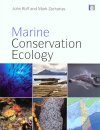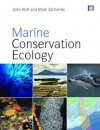By: John Roff(Author), Mark Zacharias(Author)
439 pages, colour plates, illustrations, tables
![Marine Conservation Ecology Marine Conservation Ecology]()
Click to have a closer look
About this book
Contents
Customer reviews
Biography
Related titles
About this book
Marine Conservation Ecology provides a broad coverage of the ecological foundations of marine conservation, including the rationale, importance and practicalities of various approaches to marine conservation and management. The scope of Marine Conservation Ecology encompasses an understanding of the elements of marine biodiversity – from global to local levels – threats to marine biodiversity, and the structure and function of marine environments as related to conservation issues. The authors describe the potential approaches, initiatives and various options for conservation, from the genetic to the species, community and ecosystem levels in marine environments.
They explore methods for identifying the units of conservation, and the development of defensible frameworks for marine conservation. They describe planning of ecologically integrated conservation strategies, including decision-making on size, boundaries, numbers and connectivity of protected area networks. Marine Conservation Ecology also addresses relationships between fisheries and biodiversity, novel methods for conservation planning in the coastal zone and the evaluation of conservation initiatives.
Contents
Preface
1. Introduction - Why Marine Conservation is Necessary Significance of the Oceans and Biodiversity - Threats and Management
2. The Marine Environment - Physico-Chemical Characteristics Structures and Processes - Enduring and Recurrent Factors
3. The Marine Environment - Biology and Ecology Pelagic and Benthic Realms and Coastal Fringing Communities
4. Approaches to Marine Conservation - the Options Traditional Strategies and New Frameworks
5. Representative Areas - Global to Ecoregional Marine Conservation at the Ecosystem / Habitat level
6. Habitats and Communities - Ecoregional to Local Reality, Variability and Scales of Relationships
7. Distinctive Areas - Species and Ecosystem Processes Ecosystem Processes - Ergoclines and Hotspots
8. Patterns of Biodiversity - Species Diversity Theories and Relationships - Global, Regional, Local
9. Species and Focal Species Keystones, Umbrellas, Flagships, Indicators and Others
10. Genetic Diversity Significance of Genetics - from Genes to Ecosystems
11. Coastal Zones Components, Complexities and Classifications
12. High Seas and Deep Seas Pelagic and Benthic, Hydrography and Biogeography
13. Fisheries and Biodiversity Ecosystem-based Management - Linking Fisheries and Conservation
14. Size and Boundaries of Protected Areas Rationale for - Function, Location, Dimensions
15. Evaluation of Protected Areas The Concept of 'Value' as Applied to Marine Biodiversity
16. Sets of Protected Areas Integrating Distinctive and Representative Protected Areas
17. Networks of Protected Areas Patterns of Connectivity in the Oceans
18. Marine Monitoring Programs Policy, Strategy, Targets, Effectiveness
19. Remaining problems Beyond Networks - Scales of Change and Disturbances
Customer Reviews
Biography
John Roff is Professor and Canada Research Chair in Environmental Science and Conservation at Acadia University, Canada. His prime interest is the integration of disciplines and approaches to achieve effective marine conservation.
Mark Zacharias is Adjunct Associate Professor of Geography at the University of Victoria, Canada, and Assistant Deputy Minister with the Province of British Columbia Canada. His research interests are related to how regional scale oceanographic and biological processes affect conservation efforts in marine environments.
Jon Day is Director – Ecosystem, Conservation and Sustainable Use – of the Great Barrier Reef Marine Park Authority, which manages the largest Marine Protected Area in the world. He was editor of the Proceedings of the First International Marine Protected Areas Congress, October 2005, Geelong, Australia.
By: John Roff(Author), Mark Zacharias(Author)
439 pages, colour plates, illustrations, tables
"This book will be invaluable to all of us, to inform us and educate us about why marine conservation is such a pressing necessity in the 21st century, underpinning the health and wealth of ours and future generations."
- Dan Laffoley, Senior Advisor, Marine Science and Conservation, IUCN's Global Marine and Polar Programme, and Marine Vice Chair, IUCN's World Commission on Protected Areas
"There has been a need for a major work in this field for a decade or more, and Roff and Zacharias have filled that gap. This book provides a rich, well-ordered and holistic vision of the marine environment, providing a critical framework and context for the development of marine conservation. It will be an invaluable tool for conservation practitioners and policy experts, lecturers and their students."
- Mark D Spalding, Senior Marine Scientist, Global Marine Team, The Nature Conservancy and Conservation Science Group, University of Cambridge, UK
"Roff and Zacharias have taken on the Herculean task of compiling the science foundation needed for successful marine conservation and management, and the result is a rich and rewarding synopsis of the most pertinent themes in marine ecology, presented in a user-friendly manner that lends itself to rapid uptake by planners, managers, environmentalists, and students alike."
- Tundi Agardy, Executive Director, Sound Seas




































